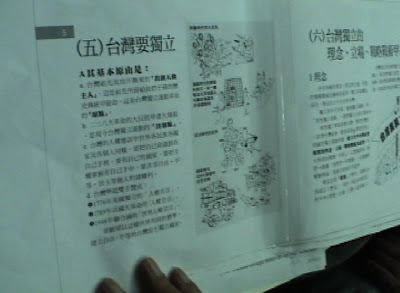Ralph Jennings' article about Su Beng appears
here on Reuters. I have much to say on it. My comments will follow shortly.
Taiwan ex-communist on long march for independenceFri Jun 29,2007 7:32PM EDT
By Ralph Jennings
TAIPEI (Reuters) - Taiwan-born Su Beng trained assiduously under Chairman Mao Zedong 60 years ago to be a communist, shunning marriage and refusing to have children so he could follow the Chinese revolution.
But more than half a century later, Su, weak and almost 90, is now back in Taiwan, long ago disillusioned with his former party as he cultivates a network to press for the self-ruled island's formal independence from China.
These days his tactics include traffic blockades and burning Chinese flags to dramatize his cause.
"In 400 years the Taiwanese have never been their own bosses. It's not independent yet," said Su, sitting in the study of his Tapei home, a room filled with books, four of which he wrote. Su's spirited tactics are aimed at promoting change from the bottom up, but they have also gotten him and his 2,000 Taiwan supporters in trouble at times.
Su, who walks with a limp and sports a mane of long white hair, is appealing a six-month sentence for setting off fireworks at the Taipei international airport in an April 2005 protest against a trip to China by a top official of the main opposition Nationalist Party.
He faces another 50 days in jail for refusing to disband a traffic blockade.
Possibly because of his age, or because today's ruling party quietly supports him, Su may be excused from serving time, his biographer said.
"Su Beng has recently risen out of relative obscurity in the wake of China's growing aggression and the Chinese Nationalist Party's questionable exchanges with China," said Felicia Lin, an English teacher in Kaohsiung, who is writing the biography.
In her blog, Lin refers to Su as an "inspiring" man who believes it is not a question of if, but when, Taiwan will gain formal independence.
Taiwan has been self-ruled since the Nationalists, headed by Chiang Kai-shek, fled there in 1949 after losing a civil war to the Communists. But it has never declared formal independence, and Beijing has threatened to invade if it ever does so.
Su, the nom-de-guerre for the man born as Shih Chao-hui, was anti-Japanese for much of his formative years, opposing Japan's colonial control of Taiwan during his time as a Waseda University student in Tokyo and later in China from 1942 to 1949.
Disheartened by what he describes as cruelty among the Communists, he returned to Taiwan shortly before the Communist victory, going back and forth between Taiwan and Japan since.
Shortly after his initial return to Taiwan, he fought Chiang Kai-shek's authoritarian rule by stockpiling old Japanese weapons, leading to charges that he was plotting to assassinate the late strongman.
He escaped the government's fury by stowing away in 1952 on a banana boat to Japan, where he persuaded authorities to let him live in exile. Su became a legend there by opening a noodle restaurant that trained revolutionaries on its fifth floor.
During his 40 years in Japan, he illegally entered Taiwan several times to try to destabilize the Nationalists and promote Taiwan independence. He returned to stay in 1993, and since then he has organized motorcades of slogan-painted taxis on weekends and started a foundation to promote his history books.
He expects local supporters to carry on his cause as he ages.
"It's their era," he says.















.jpg)

.jpg)
